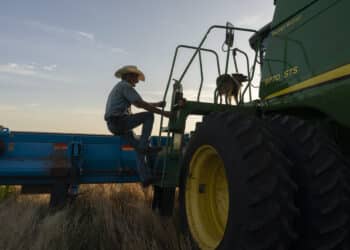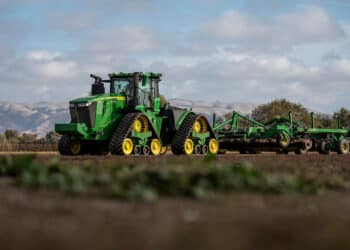CNH, Deere ‘aggressive’ with early order programs
Dealers expect more pre-sales as floorplan rates range from 9% to 11%
Agriculture OEMs are getting more aggressive with early order programs while cutting production to boost new equipment sales and right-size dealer inventories.
Early order programs (EOPs) allow farmers to purchase equipment in advance of a typical buying season, qualifying them for discounts, promotional financing or other incentives. EOPs are common during the summer to incentivize equipment purchasing ahead of harvest.
Equipment manufacturer CNH Industrial, parent company of Case and New Holland, is planning to launch its first phase of EOPs this week, Ryan Schaefer, vice president of New Holland North America, said during Ag Equipment Intelligence’s June 5 executive briefing webinar.
“We have three different phases, between cash crop equipment, commercial hay and forage and then our conventional hay and forage and mid-range tractor lines that will all be launched over the next five, six weeks,” he said.
Schaefer said he expects “healthy” early-order volumes for select hay, forage and other harvesting equipment partly because CNH has made substantial production cuts since last year, similar to other agriculture OEMs. Production cuts have allowed dealers to focus on right-sizing their fleets after years of excess inventory.
“We do have some dealers that are starting to get a little bit short on inventory and I think are interested in ordering for ’26 at a higher rate than what they would have for ’25 based on lower carryover levels,” Schaefer said.
The first phase of John Deere’s EOP for planters started June 3 and runs through July 18, according to Botkins, Ohio-based dealership Koenig Equipment. Customers who purchase during the first phase are eligible for “maximum” discounts and flexibility in scheduling the arrival of their unit, Jason Smith, a sales manager at Koenig, said in a company video.
“If you wait ’til after that first phase, then John Deere will tell us when your planter will be arriving,” he said. “Additionally, the discounts will diminish.”
Pre-sales signal shift in market
As agriculture OEMs continue to reduce production, dealers anticipate early orders and overall pre-sales to become the new norm in the industry, Josh Gruett, general manager at Waupun, Wis.-based Waupun Equipment, told Equipment Finance News. High floorplan financing costs are another factor driving the market shift, he said.
“I think part of the goal for the industry is to transition to more stuff being pre-sold instead of stuff coming in for stock, just because the carrying cost is so extreme,” he said. “Floorplan rates are averaging around 9% to 11% depending on the vendor. So, if you got that down to 6% to 9%, I think you’d see a little bit more conduciveness to stock.”
Pre-selling is especially beneficial for specialized equipment sales because if it doesn’t sell during a specific season, dealers could carry it for a year, Gruett said.
“Less is best for now,” he said. “I think you’ll keep seeing more and more early order aggressiveness from the OEMs as far as making it your absolute best discount time, versus the days of kind of having the same discounts. … New equipment-wise, it has definitely trended the right direction the last few months.”









